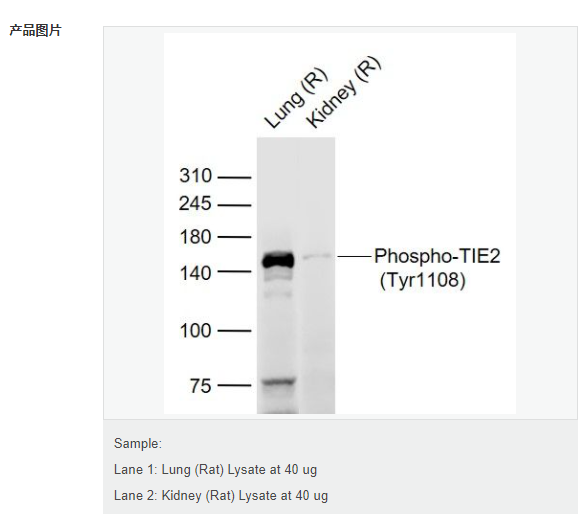

貨號
產(chǎn)品規(guī)格
售價
備注
BN40358R-100ul
100ul
¥2470.00
交叉反應(yīng):Human,Mouse,Rat(predicted:Chicken,Dog,Pig,Cow,Horse,Rabbit,Sheep) 推薦應(yīng)用:WB,IHC-P,IHC-F,IF,ELISA
產(chǎn)品描述
| 英文名稱 | Phospho-TIE2 (Tyr1108) |
| 中文名稱 | 磷酸化血管生成素受體2抗體 |
| 別 名 | p-TIE2 (phospho Y1108); Angiopoietin-1 receptor; CD202b; CD202b antigen; Endothelial tyrosine kinase; Endothelium specific receptor tyrosine kinase 2; hTIE 2; hTIE2; hTIE2; Hyk; p140 TEK; p140 TEK; Tek; tek tyrosine kinase; TEK tyrosine kinase endothelial; tek tyrosine kinase, endothelial; TIE 2; TIE2_HUMAN; Tunica interna endothelial cell kinase; Tyrosine kinase with Ig and EGF homology domains 2; Tyrosine protein kinase receptor TEK; Tyrosine protein kinase receptor TIE 2; Tyrosine-protein kinase receptor TEK; Tyrosine-protein kinase receptor TIE-2; Venous malformations multiple cutaneous and mucosal; VMCM 1; VMCM; VMCM1. |
| 產(chǎn)品類型 | 磷酸化抗體 |
| 研究領(lǐng)域 | 腫瘤 心血管 細(xì)胞生物 發(fā)育生物學(xué) 干細(xì)胞 激酶和磷酸酶 內(nèi)皮細(xì)胞 |
| 抗體來源 | Rabbit |
| 克隆類型 | Polyclonal |
| 交叉反應(yīng) | Human, Rat, (predicted: Mouse, Chicken, Dog, Pig, Cow, Horse, Rabbit, Sheep, ) |
| 產(chǎn)品應(yīng)用 | WB=1:500-2000 ELISA=1:5000-10000 IHC-F=1:100-500 IF=1:100-500 (石蠟切片需做抗原修復(fù)) not yet tested in other applications. optimal dilutions/concentrations should be determined by the end user. |
| 分 子 量 | 124kDa |
| 細(xì)胞定位 | 細(xì)胞漿 細(xì)胞膜 細(xì)胞外基質(zhì) 分泌型蛋白 |
| 性 狀 | Liquid |
| 濃 度 | 1mg/ml |
| 免 疫 原 | KLH conjugated Synthesised phosphopeptide derived from human TIE2 around the phosphorylation site of Tyr1108:TL(p-Y)EK |
| 亞 型 | IgG |
| 純化方法 | affinity purified by Protein A |
| 儲 存 液 | 0.01M TBS(pH7.4) with 1% BSA, 0.03% Proclin300 and 50% Glycerol. |
| 保存條件 | Shipped at 4℃. Store at -20 °C for one year. Avoid repeated freeze/thaw cycles. |
| PubMed | PubMed |
| 產(chǎn)品介紹 | The TEK receptor tyrosine kinase is expressed almost exclusively in endothelial cells in mice, rats, and humans. This receptor possesses a unique extracellular domain containing 2 immunoglobulin-like loops separated by 3 epidermal growth factor-like repeats that are connected to 3 fibronectin type III-like repeats. The ligand for the receptor is angiopoietin-1. Defects in TEK are associated with inherited venous malformations; the TEK signaling pathway appears to be critical for endothelial cell-smooth muscle cell communication in venous morphogenesis.TEK is closely related to the TIE receptor tyrosine kinase. Function: This protein is a protein tyrosine-kinase transmembrane receptor for angiopoietin 1. It may constitute the earliest mammalian endothelial cell lineage marker. Probably regulates endothelial cell proliferation, differentiation and guides the proper patterning of endothelial cells during blood vessel formation. Subunit: Homodimer. Heterodimer with TIE1. Interacts with ANGPT1, ANGPT2 and ANGPT4. At cell-cell contacts in quiescent cells, forms a signaling complex composed of ANGPT1 plus TEK molecules from two adjoining cells. In the absence of endothelial cell-cell contacts, interaction with ANGPT1 mediates contacts with the extracellular matrix. Interacts with PTPRB; this promotes endothelial cell-cell adhesion. Interacts with DOK2, GRB2, GRB7, GRB14, PIK3R1 and PTPN11/SHP2. Colocalizes with DOK2 at contacts with the extracellular matrix in migrating cells. Interacts (tyrosine phosphorylated) with TNIP2. Interacts (tyrosine phosphorylated) with SHC1 (via SH2 domain). Subcellular Location: Cell membrane; Single-pass type I membrane protein. Cell junction. Cell junction, focal adhesion. Cytoplasm, cytoskeleton. Secreted. Note=Recruited to cell-cell contacts in quiescent endothelial cells. Colocalizes with the actin cytoskeleton and at actin stress fibers during cell spreading. Recruited to the lower surface of migrating cells, especially the rear end of the cell. Proteolytic processing gives rise to a soluble extracellular domain that is secreted. Tissue Specificity: Predominantly expressed in endothelial cells and their progenitors, the angioblasts. Has been directly found in placenta and lung, with a lower level in umbilical vein endothelial cells, brain and kidney. Post-translational modifications: Phosphorylated. Phosphorylation is induced by ANGPT1 and ANGPT2. ANGPT1-induced phosphorylation is impaired during hypoxia. Dephosphorylated by PTPRB. Autophosphorylation at Tyr-1108 is critical for coupling downstream cell migration signal transduction pathways with ANG1 stimulation in endothelial cells. DISEASE: Defects in TEK are a cause of dominantly inherited venous malformations (VMCM) [MIM:600195]; an error of vascular morphogenesis characterized by dilated, serpiginous channels. Similarity: Belongs to the protein kinase superfamily. Tyr protein kinase family. Tie subfamily. Contains 3 EGF-like domains. Contains 3 fibronectin type-III domains. Contains 2 Ig-like C2-type (immunoglobulin-like) domains. Contains 1 protein kinase domain. SWISS: Q02763 Gene ID: 7010 Database links: Entrez Gene: 7010 Human Entrez Gene: 21687 Mouse Omim: 600221 Human SwissProt: Q02763 Human SwissProt: Q02858 Mouse Unigene: 89640 Human Unigene: 14313 Mouse Important Note: This product as supplied is intended for research use only, not for use in human, therapeutic or diagnostic applications. |
